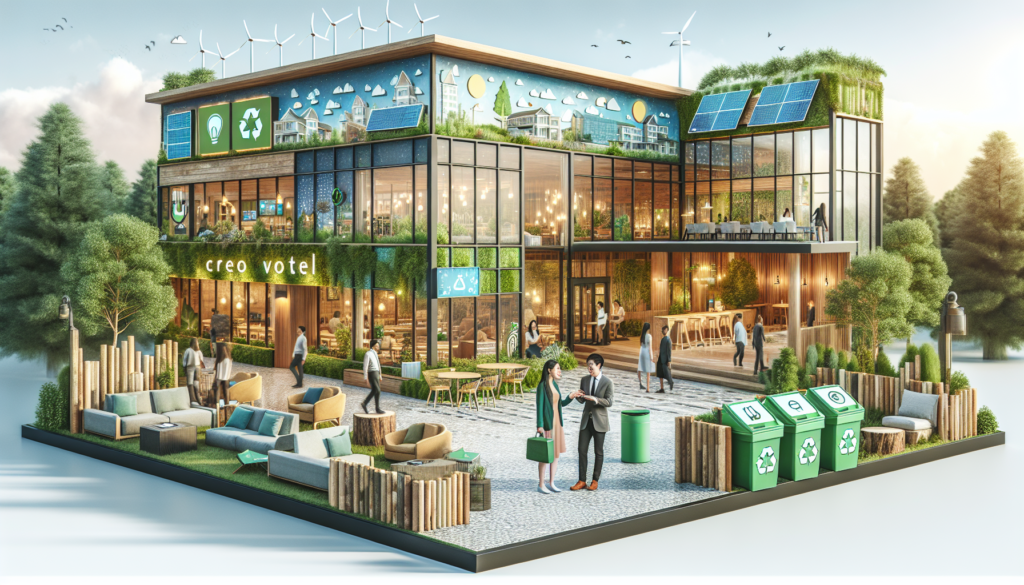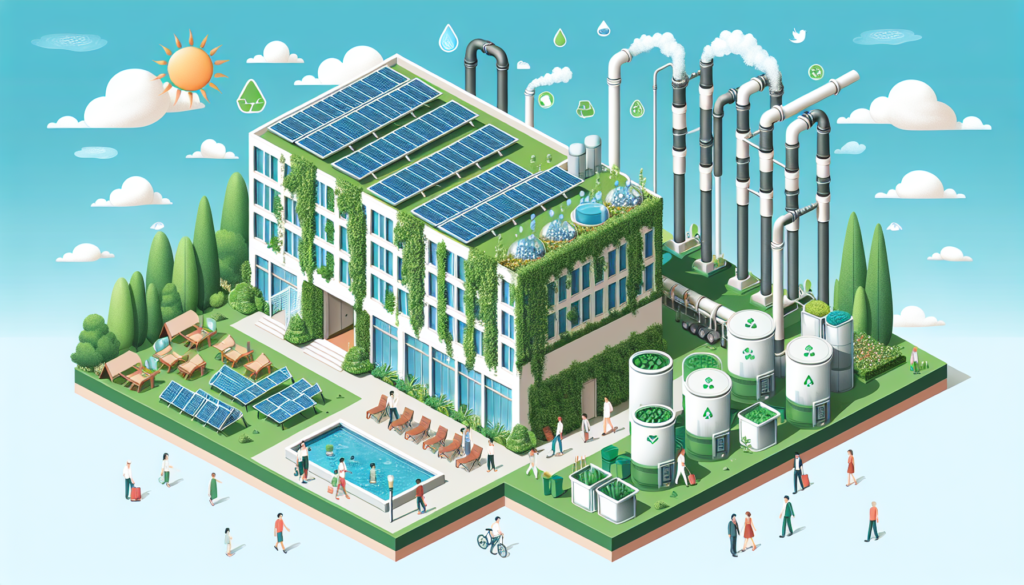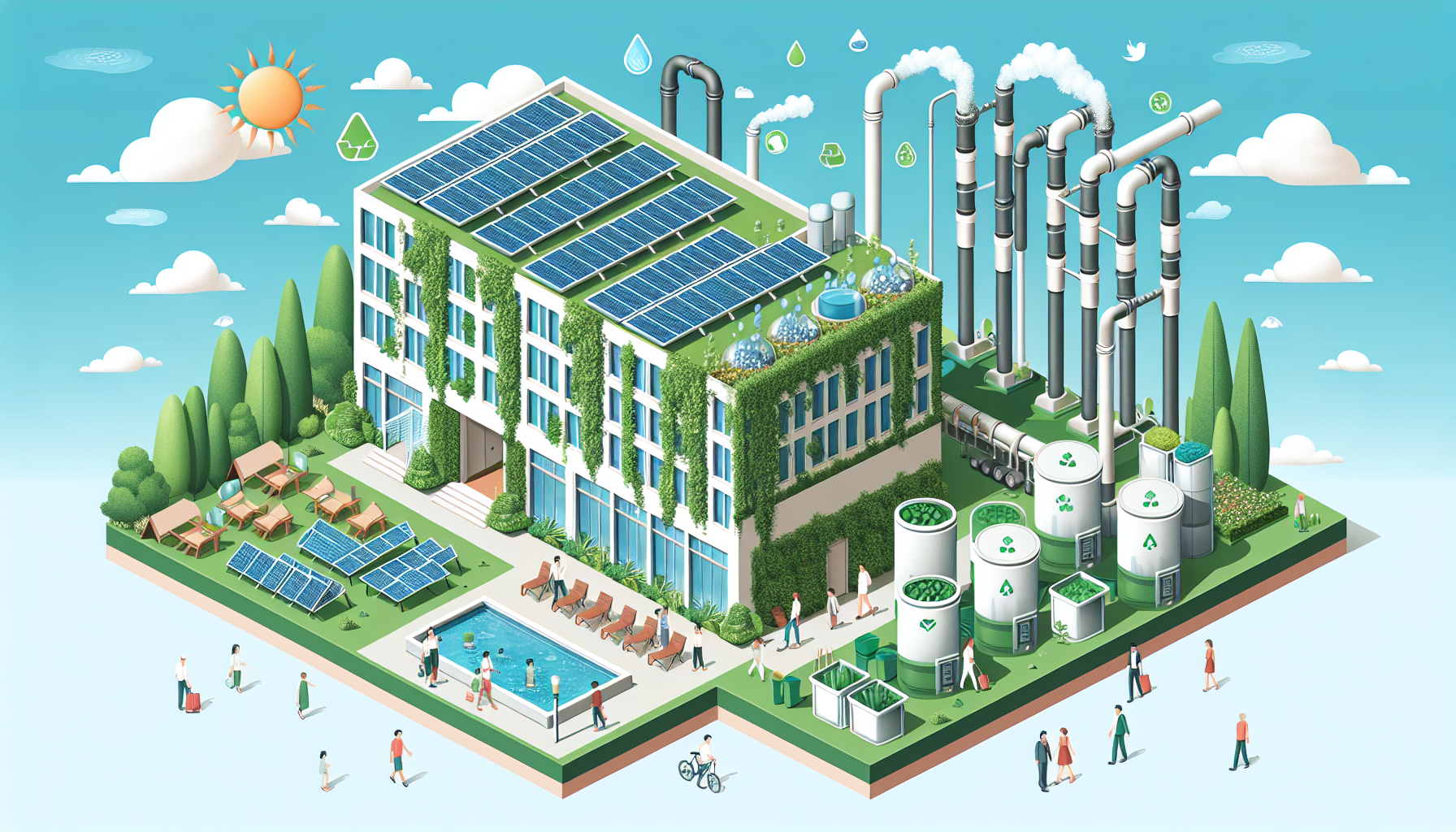Are you curious about the latest trends in the hospitality industry? Look no further! This article will take you on an exciting journey into the world of green initiatives in the hospitality industry. In a world where sustainability and environmental consciousness are becoming increasingly important, the hospitality industry is stepping up to the plate. From hotels implementing energy-saving measures to restaurants adopting environmentally-friendly practices, this article explores how the industry is embracing a greener approach. Get ready to discover the innovative ways in which hotels and restaurants are making a positive impact on the environment, without compromising on that warm and friendly hospitality that we all love.
Sustainable practices in the hospitality industry
In recent years, the hospitality industry has recognized the importance of adopting sustainable practices to minimize its environmental impact. By implementing various initiatives, hotels, resorts, and other hospitality establishments can contribute to a greener future while also reaping numerous benefits. From reducing energy consumption to promoting water conservation, the industry has made significant strides in adopting eco-friendly practices. In this article, we will explore some of the key sustainable practices in the hospitality industry and highlight the certifications and standards that promote these initiatives.
Reducing energy consumption
One of the primary goals of sustainable practices in the hospitality industry is to reduce energy consumption. By embracing energy-efficient technologies and implementing smart practices, hotels can minimize their carbon footprint while also achieving significant cost savings.
Energy-efficient lighting systems
Replacing traditional light bulbs with energy-efficient LED lighting systems is a simple yet effective step towards reducing energy consumption. LED lights consume significantly less energy and have a longer lifespan compared to traditional bulbs. By switching to LED lights in guest rooms, hallways, and common areas, hotels can create a more sustainable environment without compromising on the quality of lighting.
Smart thermostats and HVAC systems
Heating, ventilation, and air conditioning (HVAC) systems are essential for ensuring guest comfort. However, they can also be major energy consumers. By installing smart thermostats and energy management systems, hotels can optimize the operation of their HVAC systems. These systems adjust temperature settings automatically based on occupancy and time of day, ensuring optimal comfort while avoiding unnecessary energy consumption.
Renewable energy sources
To further reduce their environmental impact, many hotels are exploring the use of renewable energy sources. Solar panels, wind turbines, and geothermal systems are being implemented to generate clean energy onsite. By utilizing these sustainable energy sources, hotels can not only reduce their reliance on fossil fuels but also contribute to the broader sustainable energy movement.

Implementing waste management strategies
Effective waste management is another critical aspect of sustainability in the hospitality industry. By implementing comprehensive waste management strategies, hotels can minimize the amount of waste sent to landfills, promote recycling and composting, and reduce their overall environmental footprint.
Waste separation and recycling
Encouraging guests and staff to separate waste into recyclable and non-recyclable categories is an effective waste management strategy. By providing clearly labeled recycling bins throughout the property and educating guests about the importance of recycling, hotels can significantly increase their recycling rates. Partnering with local recycling facilities ensures that the collected recyclables are properly processed and do not end up in landfills.
Organic waste composting
Hotels can also adopt organic waste composting practices to further reduce the amount of waste sent to landfills. Composting food scraps, coffee grounds, and other organic matter not only diverts waste from the landfill but also produces nutrient-rich compost that can be used for landscaping or donated to local gardens and farmers.
Reducing single-use plastics
The hospitality industry has been under scrutiny for its use of single-use plastics, such as water bottles, toiletry containers, and disposable cutlery. To combat this issue, hotels can adopt initiatives like providing reusable water bottles for guests, installing water filtration systems in guest rooms, and offering bulk toiletries instead of individual packaging. These small changes can make a significant impact on reducing plastic waste and promoting a more sustainable environment.
Promoting water conservation
Water scarcity is a global concern, and the hospitality industry has a responsibility to minimize its water consumption. By implementing various water conservation strategies, hotels can not only reduce their environmental impact but also contribute to the preservation of this crucial natural resource.
Low-flow faucets and showerheads
Installing low-flow faucets and showerheads in guest rooms and public areas is a simple yet effective method to promote water conservation. These fixtures are designed to restrict water flow while maintaining sufficient pressure, thereby reducing water usage without compromising guest comfort.
Rainwater harvesting
Many hotels are now incorporating rainwater harvesting systems into their operations. By collecting rainwater from rooftops and storing it for non-potable uses like watering plants, flushing toilets, and cleaning outdoor areas, hotels can reduce their reliance on freshwater sources and conserve this precious resource.
Water-saving laundry equipment
Laundry operations can be water-intensive, especially in large hotels. To minimize water consumption in this area, hotels can invest in water-saving laundry equipment that utilizes advanced technologies to reduce water usage without compromising the cleanliness and quality of linens. Additionally, implementing linen reuse programs and offering guests the option to reuse towels and sheets during their stay can further contribute to water conservation efforts.

Adopting eco-friendly operating systems
In addition to implementing specific practices, the hospitality industry can also adopt eco-friendly operating systems to streamline sustainability efforts and maximize their impact. By embracing digitalization, reducing paper usage, and implementing green cleaning practices, hotels can create a more sustainable and efficient operation.
Digitalized guest services
Digitalizing guest services, such as implementing online check-in and check-out procedures, digital key cards, and mobile concierge services, reduces the need for paper usage and physical resources. This not only enhances guest convenience but also reduces the environmental impact associated with traditional paper-based practices.
Paperless operations
Hotels can significantly reduce their paper consumption by adopting paperless operations wherever possible. By utilizing electronic communication for internal processes, digitizing documentation, and embracing electronic invoicing and payment systems, hotels can minimize their reliance on paper while also increasing efficiency and reducing costs.
Green cleaning products
Traditional cleaning products often contain harmful chemicals that can be detrimental to the environment and human health. By switching to eco-friendly cleaning products, hotels can ensure a safer and more sustainable environment for both guests and staff. These products are biodegradable, non-toxic, and have a reduced impact on waterways and ecosystems.
LEED Certification
LEED (Leadership in Energy and Environmental Design) certification is one of the most widely recognized green building certifications worldwide. It provides a framework for assessing and recognizing buildings that demonstrate exceptional energy efficiency and sustainable design.
Overview of LEED certification
LEED certification is awarded based on a point system, where buildings are evaluated across various categories, including energy usage, water efficiency, materials selection, indoor environmental quality, and innovation in design. The certification levels include Certified, Silver, Gold, and Platinum, with Platinum being the highest achievement.
Benefits of LEED certification
LEED-certified hotels and resorts enjoy numerous benefits, including reduced operating costs through energy and water efficiency, improved indoor air quality for guests and staff, enhanced marketability and reputation, and a positive impact on the environment. Additionally, LEED certification aligns hotels with the growing trend towards sustainability, attracting eco-conscious travelers and corporate clients.
LEED certified hotels and resorts
Several hotels and resorts have achieved LEED certification, serving as inspiring examples of sustainability in the hospitality industry. Notable LEED-certified properties include The Park Hotel Hyderabad in India, Hotel Verde in South Africa, and the Proximity Hotel in the United States. These establishments have demonstrated exceptional commitment to sustainable practices, setting them apart as leaders in the industry.
Green Key certification
Green Key certification is another prominent sustainability certification in the hospitality industry, recognized worldwide for its rigorous criteria and comprehensive assessment of environmental performance.
Overview of Green Key certification
Green Key certification evaluates hotels based on several pillars of sustainability, including environmental management, staff involvement, water and energy conservation, waste management, and guest information. The certification offers different levels, ranging from Bronze to Platinum, ensuring that hotels can continuously work towards improving their sustainability performance.
Criteria for Green Key certification
To achieve Green Key certification, hotels must meet specific criteria in various areas, such as environmental management, water and energy conservation, waste management, and guest information. Hotels are assessed on factors like energy and water consumption, waste diversion rates, sustainable purchasing practices, and engagement with guests and staff in sustainability efforts.
Hotels with Green Key certification
Numerous hotels worldwide have obtained Green Key certification, showcasing their commitment to sustainable practices. Some notable examples include the Fairmont Waterfront Hotel in Vancouver, Canada, the Sandpearl Resort in Clearwater Beach, Florida, and the Hilton London Bankside in the United Kingdom. These hotels have successfully implemented a range of sustainable initiatives, making them role models in the industry.
ISO 50001 certification
ISO 50001 certification focuses specifically on energy management and is designed to help organizations establish and maintain an effective system for improving energy performance.
Overview of ISO 50001 certification
ISO 50001 certification follows a systematic approach towards energy management, emphasizing the establishment of policies, processes, and procedures that lead to continual energy performance improvement. The certification provides a framework for hotels and resorts to assess their energy consumption, identify areas for improvement, and implement strategies to optimize energy efficiency.
Benefits of ISO 50001 certification
Hotels and resorts that achieve ISO 50001 certification benefit from improved energy performance, significant cost savings through energy efficiency measures, enhanced reputation and credibility, and compliance with energy management regulations. The certification also promotes a culture of energy awareness and responsibility among staff and guests, fostering a more sustainable environment.
Hotels and resorts with ISO 50001 certification
Several hotels and resorts worldwide have obtained ISO 50001 certification, demonstrating their commitment to efficient energy management. Examples include the Hilton Frankfurt City Centre in Germany, the Hotel Nikko San Francisco in the United States, and the Kempinski Hotel Mall of the Emirates in Dubai. These properties have successfully implemented energy management systems, leading to reduced energy consumption and improved sustainability performance.
Challenges and barriers in implementing green initiatives
While the hospitality industry has made significant strides in adopting sustainable practices, several challenges and barriers exist in implementing green initiatives.
Cost implications
Implementing sustainable practices often involves upfront costs, such as upgrading to energy-efficient equipment, renovating facilities, or investing in eco-friendly technologies. For small and independent hotels with limited budgets, these costs can sometimes be a barrier to adopting green initiatives. However, it is important to recognize that the long-term cost savings and environmental benefits outweigh the initial investment.
Resistance from staff and management
Resistance from staff and management can be a significant challenge in implementing green initiatives. Some employees may resist changes in their routine or be skeptical about the benefits of sustainability measures. To overcome this barrier, hotels can invest in staff training and education to build awareness and support for green initiatives. Fostering a culture of sustainability within the organization can encourage staff and management to embrace sustainable practices as part of their daily operations.
Limited awareness and education
Limited awareness and education about sustainability among guests and the general population can hinder the success of green initiatives. Hotels can play a vital role in educating their guests about sustainable practices and the benefits of choosing eco-friendly options during their stay. By providing information in guest rooms, hosting educational events, and partnering with local organizations, hotels can raise awareness and encourage guests to participate in sustainability efforts.
In conclusion, sustainable practices in the hospitality industry are essential for minimizing environmental impact, reducing energy consumption, managing waste effectively, conserving water, and adopting eco-friendly operating systems. Certifications and standards such as LEED, Green Key, and ISO 50001 provide frameworks for assessing and recognizing hotels and resorts that demonstrate exceptional commitment to sustainability. While challenges and barriers exist, the industry’s ongoing efforts and continued adoption of sustainable practices will contribute to a greener and more sustainable future for the hospitality sector.

